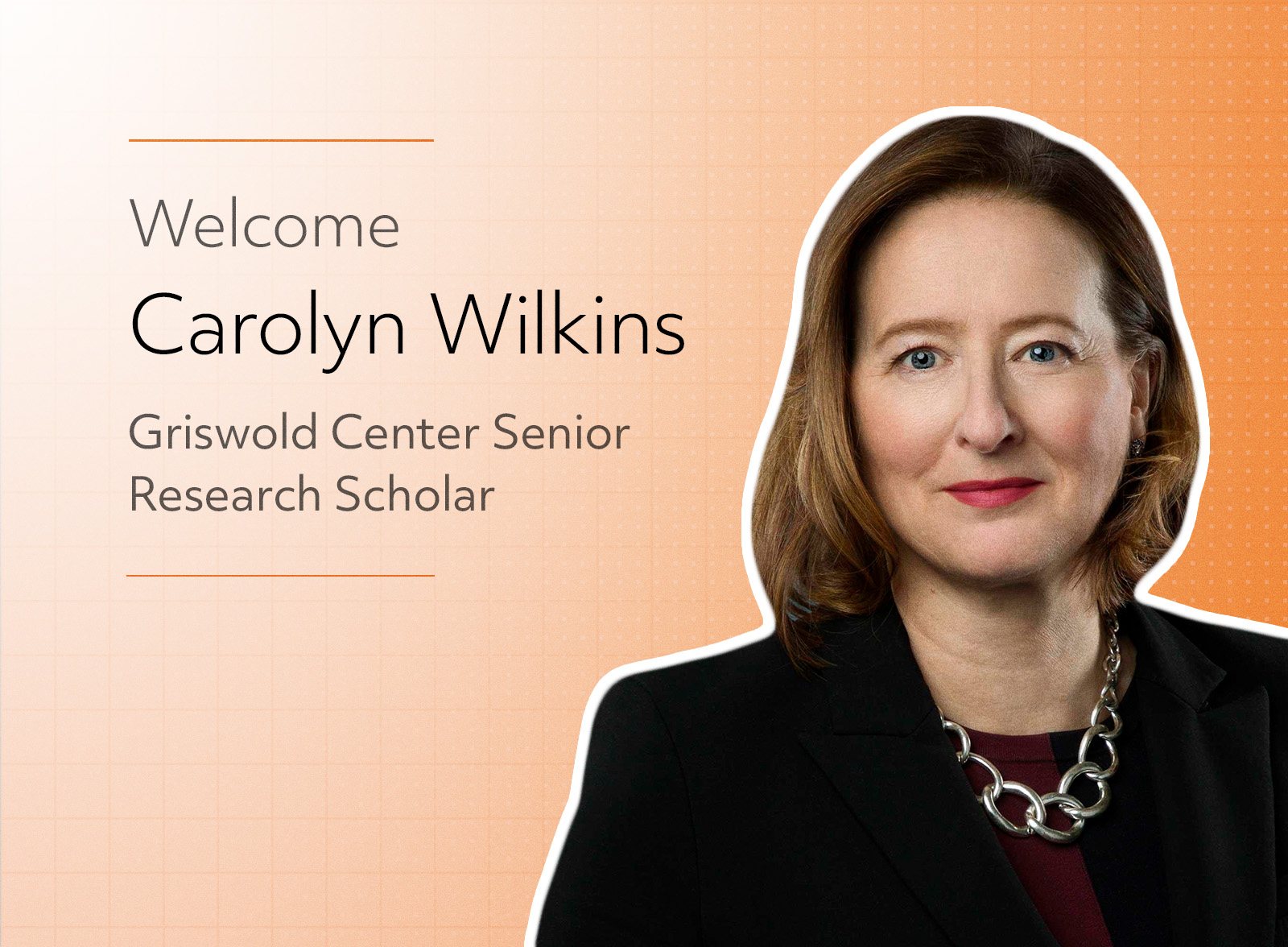Princeton’s Griswold Center Welcomes Carolyn Wilkins as a Senior Research Scholar

When Carolyn Wilkins came to Princeton in 2022, it was on the heels of an illustrious, twenty-year career at the Bank of Canada. In addition to setting monetary and financial system policies with the bank’s Governing Council–and leading several aspects of the bank’s response to the Covid-19 pandemic–she served as both a member of the international Financial Stability Board and as the Bank of Canada’s G20 and G7 deputy.
Now, as a Senior Research Scholar with the Griswold Center for Economic Policy Studies and an external member of the Financial Policy Committee at the Bank of England, she looks forward to building bridges between the policymaking world and the world of applied research.
“The best policymakers, every once in a while, roll up their sleeves and contribute to a piece of research,” she said. “I’m hoping to progress on a few projects here at Princeton.”
“I’m very pleased to welcome Carolyn to Princeton,” said Steve Redding, the Harold T. Shapiro*64 Professor in Economics and co-director of the Griswold Center. “The opportunity to host influential policy experts is core to the center’s mission of supporting policy-relevant research and fostering communication among members of the academic, business, and government communities. I know we will all learn an enormous amount from Carolyn during her time here, and I’m so grateful she decided to join us.”
Teaching the future of digital finance
As a globally-recognized expert on financial regulation and the digitalization of finance and crypto assets, Wilkins brings to Princeton timely expertise that will benefit not only Princeton students and faculty, but the global financial community.
In a much-cited Bank of Canada speech on the risks and opportunities of decentralized finance, Wilkins reviewed the many ways crypto assets “are the bedrock of the emerging financial ecosystem”–and what their emergence means for the financial regulatory environment, digital governance, and the need to modernize the traditional financial system.
“In a regulatory sense, we’re really behind,” Wilkins said. “One reason for this is that the people working in the regulatory space don’t have a deep knowledge of fast-evolving digital finance, and especially crypto and DeFi. We need to adapt what we teach so that the people coming into these positions–in government, finance, and tech–have a solid framework for thinking about these issues.”
Wilkins, herself, will play a role in thinking about that framework. In Spring 2023, she’ll teach a course on digital finance from an institutional and public policy perspective through Princeton’s Bendheim Center for Finance (BCF). Princeton BCF offers one of the world’s top-rated quantitative Master in Finance programs, and has long been at the forefront of exposing its students to emerging issues in finance.
Through Wilkins’ class, students will explore how crypto and fintech innovations relate to previous innovations in financial markets, as well as their implications for financial stability, monetary policy, and other regulatory and policy issues.
“Digitalization is a relatively new and evolving feature of the financial system. Whether you’re going to work on financial regulation and policy in the official sector, on risk management for a financial institution or on investment strategies, you’ll need to understand it for the same reasons you’d need to understand banking. This type of coursework will be a strong complement to their professional skill set.”
“It’s a very fast-moving area,” Wilkins said of the material she hopes to cover in the course. “That makes it challenging, but fun and important to teach.”
Joining the Griswold Center research hub
In addition to her work in digital finance, Wilkins is also conducting research, with Yasuo Terajima from Bank of Canada, on the implications of monetary policy and the distribution of income. She also has plans to conduct applied research in the area of DeFi, using relatively new micro data sets. In a collaboration with Bill Dudley, Griswold Center Senior Advisor and former Senior Research Scholar, Wilkins is co-chairing the Bretton Woods Digital Currency Project Team, which is tasked with identifying key outstanding issues and risks across the decentralized finance regime.
“When you’re really busy doing policy, you don’t have as much time to work on your own ideas. At Princeton there are a lot of people working in research areas that interest me and are extremely policy relevant. I’m looking forward to getting into the weeds and producing some of the research that evidence-based policy requires.”
As a hub for discussion of policy-relevant research, the Griswold Center looks forward to Wilkins’ participation in center events, activities, and lectures in the months ahead. A full calendar of Griswold Center events and activities can be found on the center’s website.